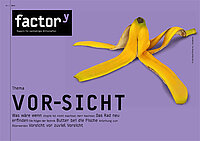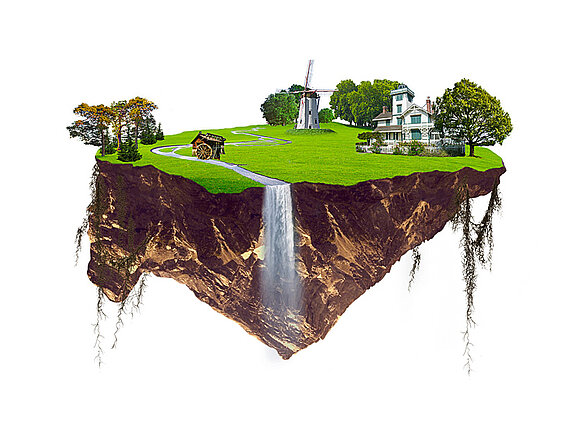Be(a)ware
To be(a)ware Means Shaping the Future

According to John Naisbitt, author of the book Megatrends and inventor of the term ‘globalisation’, the best way to predict the future is to understand the present.
However, Frederic Vester, biochemist, cyberneticist and author of a best-seller about learning, thinking and forgetting, believes that the answer to our problems will come from the future instead of the past. So which one is it supposed to be? What will help us predict what is coming next? The past, present or future? It won’t be just one of them, that's for sure. The fact that we cannot carry on with business as usual or rely either on conventional technology or even on as-of-yet non-existent technical solutions seems just as obvious. In light of cyclical economic and fiscal crises, increasing climate change, unlimited exploitation of natural resources, and an ever-growing gap between the rich and the poor, we lack an alternative. An alternative that will make an ecologically, economically, and socially just utopia become reality; which will protect our natural environment instead of destroying it.
Sustainable development is just such an alternative. However, it needs to become more politically charged and more attractive on an emotional level, said futurologist Karlheinz Steinmüller during an interview with factory. Klaus Dosch, Scientific Director of the Kathy Beys-Foundation based in Aachen, explains that scenarios can help people envision several options for development and thus help them to choose one over the other. Ecological innovations alone will not suffice to save the planet, as one can see by consulting statistics: The increasing number of patent applications correlates with the increasing consumption of natural resources. The philosopher Bernd Draser sees social innovations as the key to doing more with less, by which he is referring to the recollection of social traditions. Those could be an option to counter demographic change, as is explained in Growing Older 101 by psychologist Manfred Nedler. The sociologist Ortwin Renn argues in favour of creating new strategies for developing a new society while discussing new technologies and their possible effects. The example of aqua cultures in the article by Bert Beyers also shows that it is possible to work with diminishing resources. Instead of being just reactive, we need to become more proactive and actively shape our future the way we envision it. In order to succeed, we have to ask the right questions. Instead of asking ourselves how we WILL live in the future, we should think about how we WANT to live.
Thus, I hope you will enjoy our be(a)ware edition, which carefully combines our topic range of future-vision-utopia and sustainability.
Ralf Bindel
Editor
PS: Our PDF-Issue Be(a)ware filled with helpfully numbers and quotes is more nicely illustrated and better readable on tablet computers and screens.
Themen
- The Domino Effect: the Mobility Transition as an Engine for the ‘Great Transformation’
- Cities Use the Space
- Decarbonization by 2030
- The fear of biting the hand that feeds you
- Where investing is a pleasure
- Why divestment is going to change the world
- A Robin Hood tax for climate protection
- May the Force Be with Us
- Modern Strategies
- The prerogative of interpreting the future now lies with the companies involved in climate protection”
- From Negotiating to Trading Equitably
- Can a donkey be tragic?
- Rethink rather than rebound: a sufficiency revolution must precede the efficiency revolution
- On Rebound, Prebound and Performance Gaps
- So Let Us Seize Power Then!
- With Common Property Against Political Failure
- So Let Us Seize Power Then!
- The Comforting Beauty of Failure
- “It Is Not Impossible at All.“
- Resource-light shopping
- Men Have Not Stopped Giving the Advantage to Women – So Far
- Toothpaste for Princesses and Soup for Pirates
- It is about equality
- A nice day
- Initiative instead of frustration
- The right ingredients
- Resilient for Life
- Not only, but also
- Appreciation – more please!
- Worth more than money
- Learning to value the value of goods
- Worth and Values
- The Transformative Power of Science
- Historically effective: How innovation and technology transform
- The Disappearance of Products
- Growing Older 101
- Columbus’ Egg
- It Works! In Theory at Least ...
- What If...?
- Analysing Separately – Thinking and Acting Together!
- Let’s Break Away from Determined Breaking Points
- More Gold in Waste than in Mines
- The art of separation
- Should you really DIY?
- The Aesthetics of Do-It-Yourself
- Standing on One’s Own Feet
- From the handaxe to desktop fabrication
- Using Shares to Survive the Crisis
- When Citizens participate
- Possess to Participate
- The Right Growth at the Right Time
- Gunter Pauli and Blue Economy
- When Sustainability Grows
- How we treat Growth
- Illusions about Growth






